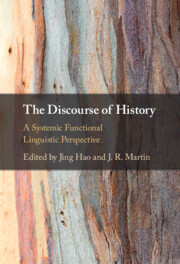Book contents
- The Discourse of History
- The Discourse of History
- Copyright page
- Contents
- Figures
- Tables
- Contributors
- Preface
- 1 Building Historical Knowledge through Language: A Systemic Functional Linguistic Perspective
- 2 Cultivating a Critical Gaze: Managing Technicality in Ancient History Teaching
- 3 Cultivating the Value of Democracy in History Teaching
- 4 Interpreting History: Valuing Events in a Postcolonial World
- 5 Coordinating Meaning: Scaffolding Teaching/Learning in Pedagogic Discourse
- 6 Explaining What Happened: Logical Metaphors in Spanish History Textbooks
- 7 Negotiating Values through Historical Evidence
- 8 Historical Empathy: Learning to Care about Others’ Suffering through Film
- 9 History in the Arts: Exploring the Past to Cultivate Students’ Gaze
- 10 Describing and Taxonomising the Phenomena of a Glorious Past
- 11 Representing Minority History in a Multi-Ethnic Country
- 12 Expressing Attitudes in Ancient Chinese History
- References
- Index
2 - Cultivating a Critical Gaze: Managing Technicality in Ancient History Teaching
Published online by Cambridge University Press: 16 May 2024
- The Discourse of History
- The Discourse of History
- Copyright page
- Contents
- Figures
- Tables
- Contributors
- Preface
- 1 Building Historical Knowledge through Language: A Systemic Functional Linguistic Perspective
- 2 Cultivating a Critical Gaze: Managing Technicality in Ancient History Teaching
- 3 Cultivating the Value of Democracy in History Teaching
- 4 Interpreting History: Valuing Events in a Postcolonial World
- 5 Coordinating Meaning: Scaffolding Teaching/Learning in Pedagogic Discourse
- 6 Explaining What Happened: Logical Metaphors in Spanish History Textbooks
- 7 Negotiating Values through Historical Evidence
- 8 Historical Empathy: Learning to Care about Others’ Suffering through Film
- 9 History in the Arts: Exploring the Past to Cultivate Students’ Gaze
- 10 Describing and Taxonomising the Phenomena of a Glorious Past
- 11 Representing Minority History in a Multi-Ethnic Country
- 12 Expressing Attitudes in Ancient Chinese History
- References
- Index
Summary
In this chapter we explore the teaching of ancient history in an Australian junior secondary school classroom, focusing particularly on how the knowledge of government in city-states in Ancient Greek are developed. We show that an important part of knowledge building in ancient history involves ‘factoring out’ the meanings which are condensed in technical terms – characterised informally as ‘flexi-tech’ because of the weakly classified nature of the terms. Throughout two history lessons, the teacher guides the students to think ‘critically’ about how types of government are categorised. We show that while Spartan government is referred to in different pedagogic materials as a monarchy, an oligarchy, or a military state, as the lessons unfold the teacher repositions Spartan government as a complex structure – comprising elements of different kinds, including specific elements of democracy. Our analysis focuses on how this repositioning is achieved and what kind of ‘critical thinking’ is involved.
Information
- Type
- Chapter
- Information
- The Discourse of HistoryA Systemic Functional Linguistic Perspective, pp. 16 - 44Publisher: Cambridge University PressPrint publication year: 2024
